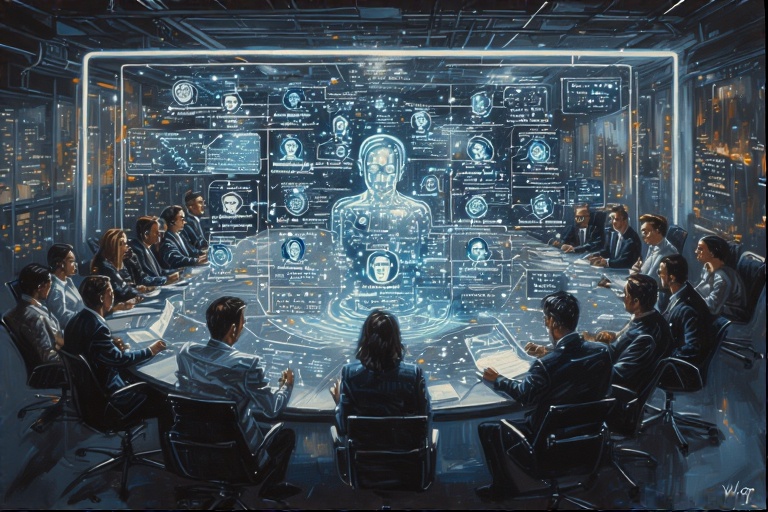Of course. Here is a comprehensive article on AI agents, including a section listing some of the most popular platforms available today.
The Future is Agentic: Are Autonomous AI Agents the Next Big Thing?
For years, we’ve interacted with AI as a tool. We ask a question, and a chatbot gives an answer. We give a command, and a smart assistant plays a song. We are direct participants, guiding the AI at every step. But a fundamental shift is on the horizon, moving us from AI as a passive tool to AI as an active partner: the autonomous agent.
This isn’t just a more advanced chatbot. It’s the beginning of a new era in human-computer interaction, where we move from giving instructions to delegating outcomes. Experts predict this “agentic AI” will be as transformative as the personal computer or the smartphone.
What Exactly is an AI Agent?
An AI agent is a system designed to work autonomously toward a goal with minimal human intervention. Instead of waiting for a specific command, you give an agent a complex objective, and it formulates and executes a plan to achieve it.
Think of it this way:
-
A chatbot is like asking a research assistant to find a specific book in the library.
-
An AI agent is like asking that assistant to write an entire research paper on a topic, complete with sources, analysis, and a conclusion.
These agents are powered by advanced large language models (LLMs) that act as their “brain.” They can reason, create multi-step plans, and most importantly, use tools. An AI agent can browse the web, write and execute code, access other applications, and learn from its successes and failures to refine its approach.
How Will Agents Change Our Daily Lives?
The potential applications are vast and could redefine both personal productivity and professional workflows.
In Your Personal Life: Imagine delegating complex tasks like these to a personal agent:
-
Travel Planning: “Find and book a relaxing weekend trip for two to the coast next month. Keep the total budget under $1000, prioritize hotels with good reviews, and create a suggested itinerary.”
-
Daily Management: “Monitor my emails and automatically schedule meetings for Project X, making sure to avoid my lunch break. Summarize any urgent requests for me each morning.”
In the Workplace: AI agents could function as tireless, highly efficient digital team members:
-
Automated Marketing: An agent could be tasked with analyzing market trends, drafting a social media campaign, generating images and copy, scheduling the posts, and reporting on their performance.
-
Business Analysis: An agent could be instructed to “Analyze our Q3 sales data, identify the top-performing products and underperforming regions, and generate a slide deck with visualizations to present the findings.”
Popular AI Agents You Can Try Today
While the technology is still emerging, several platforms allow you to experience the power of AI agents firsthand. These are some of the most popular options available right now:
-
MultiOn: One of the most advanced agents available to the public. MultiOn acts as an “AI web browser” that can take actions on your behalf. You can ask it to book flights, order food, fill out forms, or apply for jobs, and it will navigate websites to complete the tasks.
-
AgentGPT: This platform allows you to assemble and deploy autonomous AI agents directly in your browser. You can give your agent a name and a goal, and then watch as it thinks, creates a plan, and executes its tasks by browsing the web and gathering information. It’s an excellent tool for research and learning.
-
Devin (by Cognition Labs): Hailed as the first “AI software engineer,” Devin is a highly specialized agent designed for coding and software development tasks. It can take a project request, write the code, debug it, and deploy a finished product. Access is currently limited, but it represents the cutting edge of agentic AI.
-
CrewAI: For those with some technical skill, CrewAI is a powerful open-source framework for orchestrating role-playing, autonomous AI agents. It allows you to create a “crew” of agents (e.g., a “Researcher” and a “Writer”) that collaborate to tackle complex tasks.
The Hurdles on the Horizon
While the promise is immense, the path to a fully agentic future has significant challenges that developers are actively working to solve.
-
Safety and Control: The biggest challenge is ensuring agents operate safely and predictably. How do you prevent a “runaway” agent from taking unintended, harmful actions? Creating robust guardrails is paramount.
-
Reliability: For multi-step, complex tasks, a single error can derail the entire process. Agents need to become far more reliable and capable of self-correction before they can be trusted with high-stakes objectives.
-
Security: Giving an AI agent access to your personal email, bank accounts, or company data creates a massive security risk. Protecting these systems from being compromised is a critical and difficult task.
The Dawn of the Agentic Age
We are at the very beginning of this transformation. While fully autonomous agents are still in their early stages, the building blocks are being assembled at a breathtaking pace. This shift will require us to develop new skills, moving from “doing” the work to defining the objectives and overseeing our new digital counterparts. Get ready to change how you work, plan, and create—the agentic age is coming.
